Chickpea Flatbread
Chickpea flatbread is a delicious and nourishing treat that can be enjoyed as a simple snack, or as part of a meal. It is naturally gluten-free and is both quick and easy to make. In fact, this recipe will suit a wide variety of intolerances given it contains so few ingredients overall.

In This Article
A Bit Of History
Chickpea flatbread is said to have its origins in Genoa, Italy. However, it’s a much-loved street food in many countries with some ingredient variations depending on where it’s found. In Italy it’s known as farinata (in Liguria), or cecina or torta di ceci (in Tuscany). In Nice and the Côte d’Azur, it’s known as socca, in Argentina and Uruguay it’s known as fainá, and in India it’s besan chilla (or cheela).
How it’s classified can also differ. In some places it’s referred to as a chickpea flatbread. Others say it’s a chickpea pancake or chickpea crêpe. This is likely the result of smalls modifications in both ingredients and the method of cooking.
This recipe is much more flatbread-like given it’s thicker and chewier than a pancake.
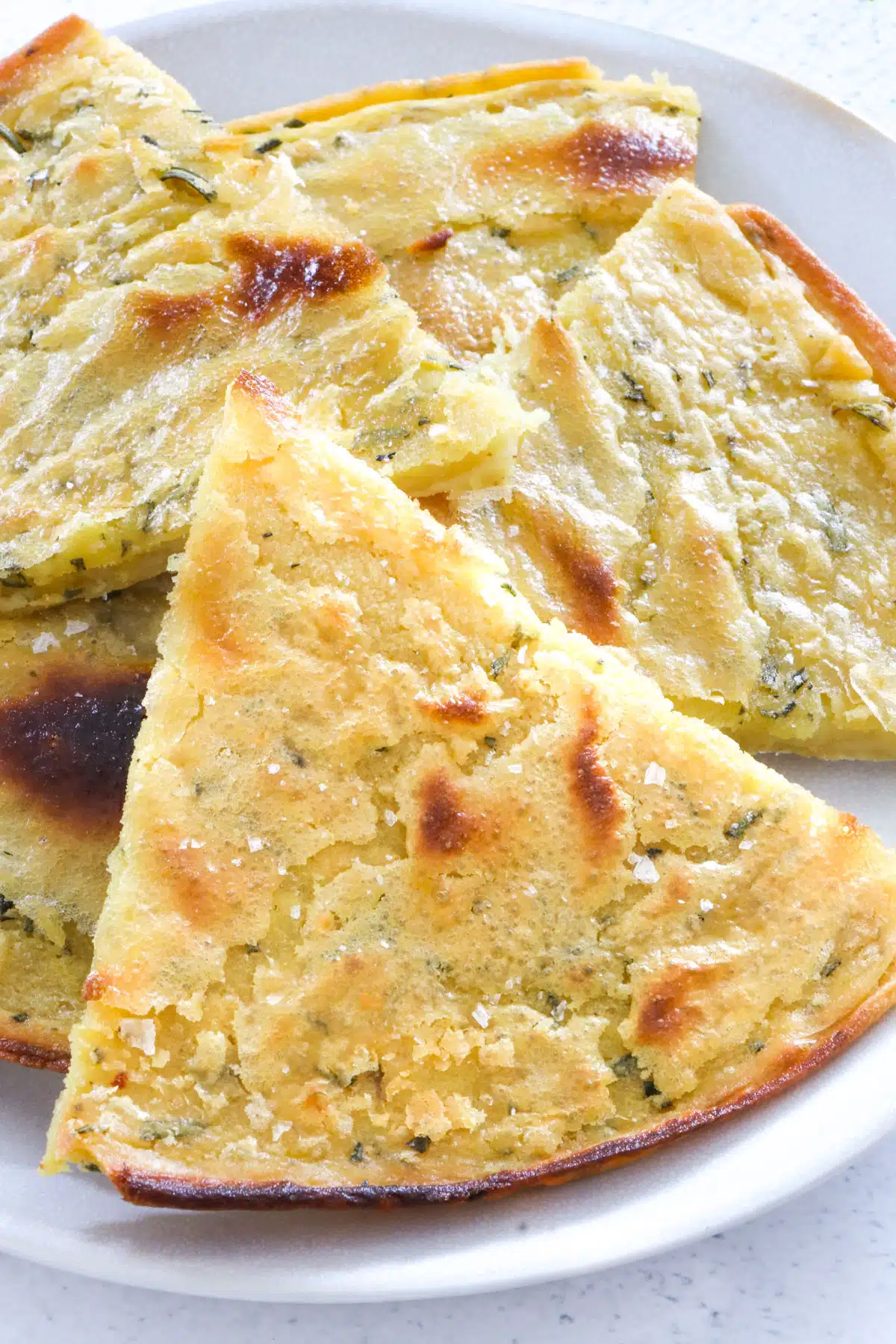
Ingredients Needed For This Recipe
To make this flatbread you’ll need just a handful of simple ingredients. The key ingredient of course being chickpea flour, which is available in most supermarkets. The other essentials you’ll likely already have in your pantry and the garden.

- Chickpea flour – Depending on where you live, this may be called chickpea, besan, garbanzo, or gram flour. It’s the important base ingredient so can’t be substituted for other flours.
- Water – Ensure you use lukewarm water, as it’s absorbed more quickly by the flour. In turn, we get a smoother batter with less resting time needed.
- Salt – Adding flavour in this recipe.
- Olive oil – Adding flavour but also helps to crisp up the flatbread as it’s baking.
- Rosemary – Simply adding flavour.
Rosemary is the traditional flavouring for chickpea flatbread although I’ve also trialled others. Dukkah is especially good, but I love it with oregano too.
How To Make Chickpea Flatbread
This recipe is very quick and easy to make though you do need to remember to preheat the skillet. Using the right pan is essential to getting this right too. I suggest a cast iron skillet or any you have that is very well seasoned, so the flatbread doesn’t stick while cooking.
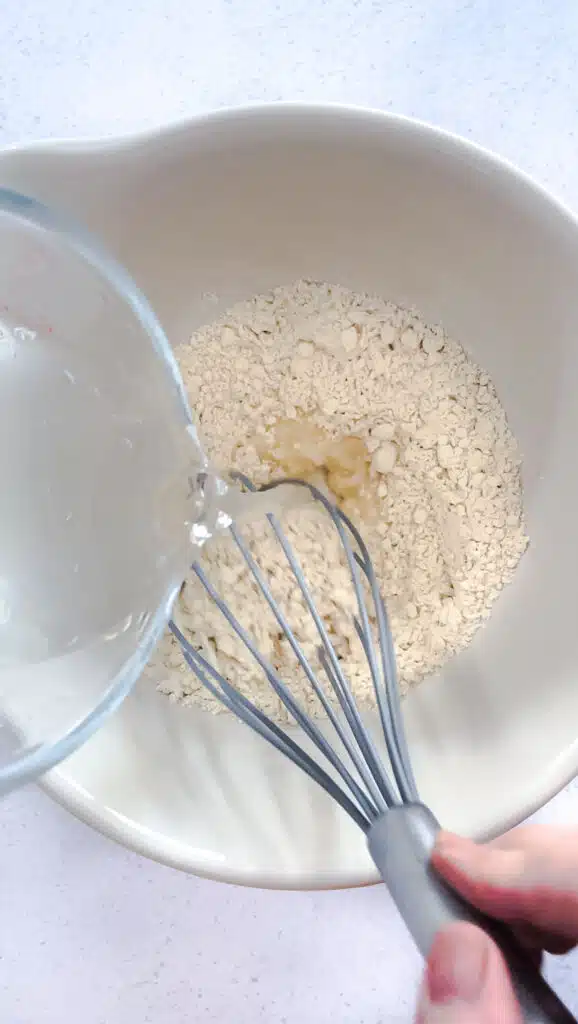

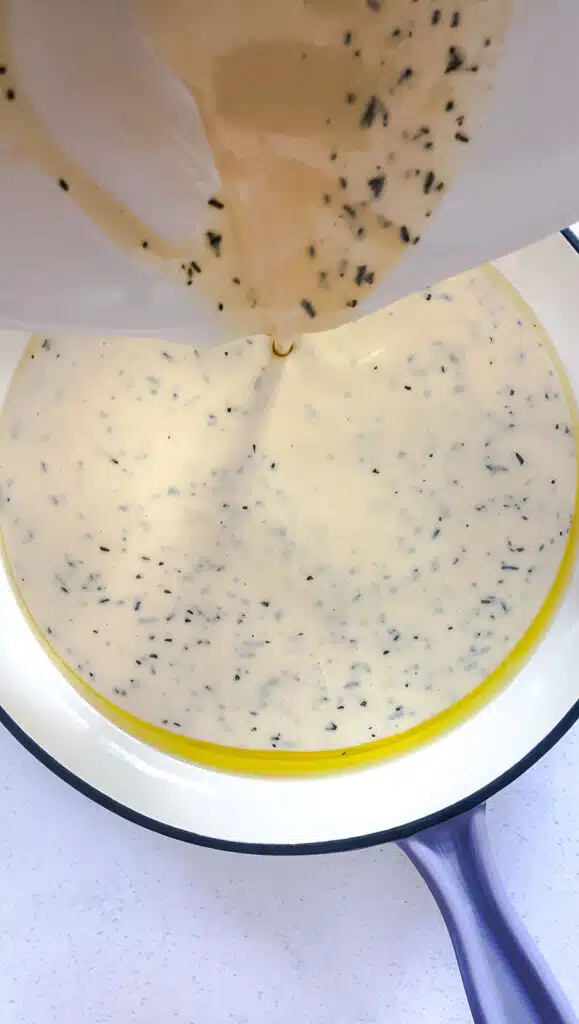
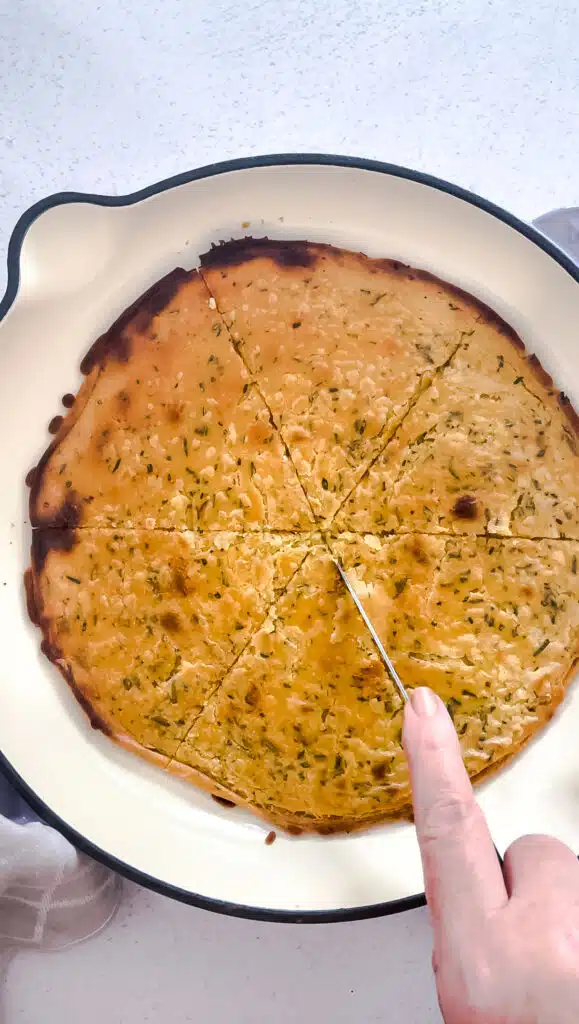
- Put a 23cm / 9″ skillet into the oven and turn it onto 230ºC / 450ºF to preheat. 210ºC/410ºF for fan forced.
- Mix together the chickpea flour and salt in a large bowl then slowly whisk in the warm water. Ensure the batter is smooth and without lumps when combined.
- Next mix in 1 tablespoon of olive oil and set the bowl aside.
- Finely chop the rosemary then add it to a small saucepan with 2 tablespoons of olive oil. Gently warm through for 2 – 3 minutes until it’s simmering, then remove and rest for a minute or two. Now add this to the flatbread batter and stir to combine.
- Take the pre-heated skillet from the oven and pour in 1 tablespoon of oil. Swish it around to coat the entire pan then pour in the batter. Return the pan to the oven and cook for 15 minutes or until the edges are brown and the flatbread is firm.
- Remove the flatbread from the oven and brush with the final 2 tablespoons of olive oil. Heat the oven’s grill/broiler and place the skillet under it for 2-4 minutes or until it’s slightly browned on top.
- Take the skillet from the oven, cut into wedges, sprinkle with a little extra salt and serve.
This flatbread is delicious as a standalone snack or when served with meals. It’s great with antipasto, served with soup, or even with dips.

FAQ
Traditionally no, and this recipe certainly isn’t, but I have seen it done! To do this you would first mix the flour and water to make a batter. Then cover and leave to ferment on the bench for a couple of days. In that time, you’ll need to stir the batter several times a day until it froths and smells sour. After that, add the salt and oil to the batter and continue on with the recipe above. Please note I have not tried this as yet – so you may need to experiment for best results.
Chickpea flour is considered to be an excellent source of nutrients as it contains a good amount of protein and fibre. In addition, it’s rich in polyunsaturated fats (good for heart health), B complex vitamins, and minerals such as iron, magnesium, and zinc.
Watch How To Make This Recipe
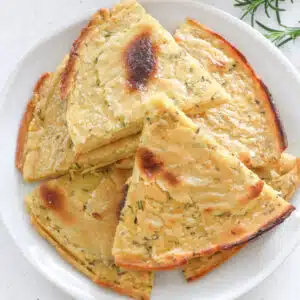
Chickpea Flatbread | Farinata
Equipment
- 1 Cast iron skillet
Ingredients
- 1 cup chickpea flour (see note 1)
- 1 cup lukewarm water
- 6 Tbsp olive oil
- 1.5 tsp salt
- 1 Tbsp chopped rosemary (about 1 large sprig)
Instructions
- Place a 23cm / 9″ skillet into the oven and turn it onto 230ºC / 450ºF to preheat (210ºC / 410ºF fan forced). See note 2.
- Mix together the chickpea flour and salt in a large bowl then slowly whisk in the warm water. Ensure the batter is smooth and without lumps when combined.
- Next mix in 1 tablespoon of olive oil and set aside briefly.
- Finely chop the rosemary then add it to a small saucepan with 2 tablespoons of olive oil. Gently warm through for 2 – 3 minutes until it’s simmering, then remove and rest for a minute or two. Now add this to the flatbread batter and stir to combine.
- When the oven has come to temp, take out the pre-heated skillet and pour in 1 tablespoon of olive oil. Swish it around to coat the entire pan then pour in the batter. Return the pan to the oven and cook for 15 minutes or until the edges are brown and the flatbread is firm.
- Remove the skillet from the oven and brush the flatbread with the final 2 tablespoons of olive oil. Heat the oven’s grill/broiler and place the skillet under it for 2-3 minutes or until it’s slightly browned on top.
- Take the skillet from the oven, cut into wedges, sprinkle with a little extra salt and serve.
Notes
Nutrition
Pin This Recipe For Later

Want Recipes To Enjoy With This Flatbread? Take A Look At These!
NEVER MISS A THING!
Follow me on Facebook, Instagram, and Pinterest to keep up to date with all my latest recipes, hints, and tips.
